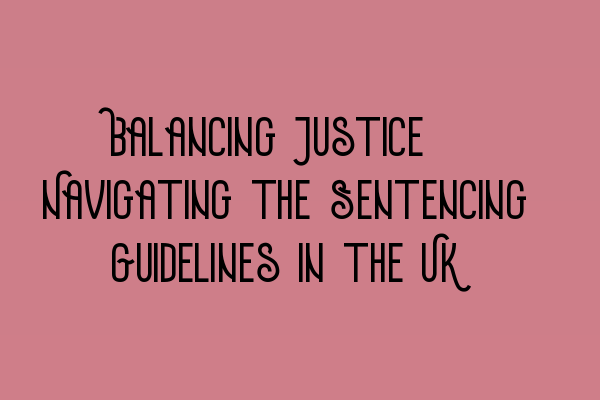Balancing Justice: Navigating the Sentencing Guidelines in the UK
When it comes to criminal law in the UK, one crucial aspect that ensures fairness and consistency in sentencing is the Sentencing Guidelines. These guidelines provide a framework for judges and magistrates to determine the appropriate punishment for a wide range of offenses. As a solicitor specializing in criminal law at SQE Criminal Law & Practice Law UK, I understand the importance of navigating these guidelines to achieve a balanced and just outcome for our clients.
The UK Sentencing Guidelines are a comprehensive set of rules and principles that aim to promote transparency, proportionality, and uniformity in sentencing. They take into account various factors such as the seriousness of the offense, the level of harm caused, and the culpability of the offender. By considering these factors, judges can tailor the punishment to fit the individual circumstances of each case.
One key element of the Sentencing Guidelines is the categorization of offenses into different brackets. These categories range from the most serious (Category A) to the least serious (Category H). Each category carries a corresponding range of potential sentences, which allows for flexibility in sentencing while maintaining consistency within similar cases. For example, a Category A offense such as murder may carry a life imprisonment sentence, while a Category H offense like theft may result in a community order or a fine.
To determine the appropriate sentence within these categories, judges consider both aggravating and mitigating factors. Aggravating factors are circumstances that make the offense more serious, such as premeditation or the use of violence. Mitigating factors, on the other hand, are circumstances that reduce the offender’s culpability, such as genuine remorse or an absence of previous convictions. Balancing these factors is essential to ensure that the punishment is proportionate to the crime committed.
Of course, the sentencing process is not without its challenges. Judges often face difficult decisions when the circumstances of a case fall outside the norm or when multiple offenses are involved. In such situations, they must exercise their judicial discretion and carefully assess all the relevant factors to reach a fair and just verdict.
As solicitors at SQE Criminal Law & Practice Law UK, we strive to guide our clients through the intricacies of the Sentencing Guidelines. Our in-depth understanding of the guidelines allows us to present strong arguments and ensure that our clients’ rights are protected throughout the sentencing process.
When representing clients, we follow a meticulous approach that involves thorough research, analysis, and preparation. We consider the specific details of each case and identify any unique factors that may influence the sentencing outcome. By doing so, we can present a comprehensive and persuasive case to the court, increasing the chances of a favorable outcome for our client.
At SQE Criminal Law & Practice Law UK, we offer a range of preparation courses to assist aspiring solicitors in their journey towards becoming qualified professionals. Our SQE 1 Preparation Courses provide a solid foundation in the key areas of criminal law and procedure, while our SQE 2 Preparation Courses offer comprehensive guidance on advocacy and legal skills. These courses are designed to equip aspiring solicitors with the knowledge and skills necessary to excel in the SQE exams and achieve success in their legal careers.
If you’re currently preparing for the SQE exams, practicing with SQE 1 Practice Exam Questions and SQE 1 Practice Mocks FLK1 FLK2 can significantly enhance your understanding and performance. These resources provide realistic exam-like scenarios that simulate the challenging nature of the SQE exams, allowing you to refine your knowledge and skills in a practical setting.
As a solicitor, it’s crucial to stay up-to-date with the latest developments in the legal field. The SRA SQE Exam Dates play a vital role in planning your exam preparation and ensuring that you’re well-prepared for the assessment. Being aware of the exam dates allows you to create a study schedule and allocate sufficient time for revision and practice.
In conclusion, the Sentencing Guidelines serve as a cornerstone of the criminal justice system in the UK, providing a framework for fair and consistent sentencing. As solicitors at SQE Criminal Law & Practice Law UK, we are dedicated to navigating these guidelines and achieving a balanced and just outcome for our clients. Whether you’re an aspiring solicitor preparing for the SQE exams or in need of legal representation, our team is here to guide you every step of the way.
